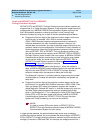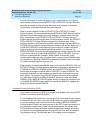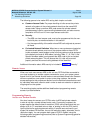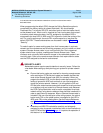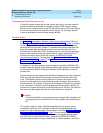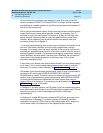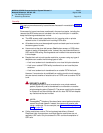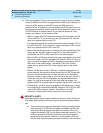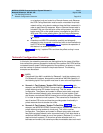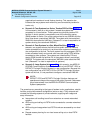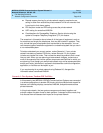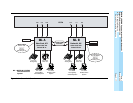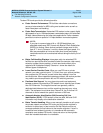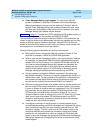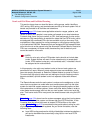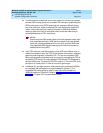
MERLIN LEGEND Communications System Release 6.1
Network Reference
555-661-150
Issue 1
August 1998
Call-Handling Scenarios
Page 2-14Network Configuration Scenarios
2
on a tandem trunk and routed to a Remote Access code. Because
the COR Calling Restriction must be set to unrestricted for private
network calling, using barrier codes on these facilities is essential in
order to apply security measures. When a Remote Access code is
included in the non-local dial plan of the calling system, the caller’s
barrier code FRL on the called system is compared to the UDP or
ARS route FRL on the called system. See the
Feature Reference
and “Remote Access Default Class-of-Restriction Settings” on page
6 for details.
■
Extension and ARS FRLs should be carefully and stringently
assigned in order to prevent unauthorized trunk-to-trunk transfers to
local PSTN facilities. Table 4–1, page 4-3
explains the operation of
this feature in a networked system.
Chapter 4, “Security,” explains FRLs and how they affect routing in more
detail.
Network Configuration Scenarios 2
In this topic, the networking scenarios are distinguished by the types of facilities
that connect the systems, geographic locations of the systems, the PSTN facilities
connected to each system, the arrangement of the systems in a series or in a star,
and the number of systems included in the private network. The following
examples are discussed:
NOTE:
Centralized Voice Mail is available for Release 6.1 and later systems only.
For Release 6.0 systems, disregard the centralized VMS/AA capability in
the following topics. Each system must have its own voice mail application.
■ Scenario 1: Two Systems, Tandem PRI Facilities, page 16. In this
example, two MERLIN LEGEND Communications Systems are linked in a
private network using PRI tandem trunks only. This is a
series
configuration
. The systems are located in different area codes, and each
has public-switched network trunks connected to its local system. Each
also shares a centralized VMS/AA located at one of the systems. (Release
6.1 or later is required on both systems.) This scenario also illustrates the
use of tandem PRI trunks and how they provide greater functionality in
private networks than do tandem tie trunks.
■ Scenario 2: Two Systems, Tandem Tie Facilities, page 32. In this
example, two MERLIN LEGEND Communications Systems are linked in a
private network using tandem tie trunks only. This is also a series
configuration. The systems are located in different area codes, and each
has public-switched network trunks connected locally. Each also shares a
centralized VMS/AA located at one of the systems. (Release 6.1 or later is
required on both systems.) To show how private networks work in a
business environment, this scenario provides more details about real-world



